
I want to skip ahead for a second, because against everything I experienced previously while watching Hallmark's nonsensically titled holiday movie "Hanukkah on Rye," I cried at the end. There's a moment where the romantic leads' grandmothers realize they have a deeper connection than the plot contrivance of their respective deli behemoths, and I was, in spite of my better judgment, touched. Images of diasporic Jews finding each other after lifetimes apart will always carry with it a certain bittersweet resonance, even when it comes after 80 minutes of regressive vapidity. Ya got me.
To watch "Hanukkah on Rye" is to experience a racial othering in real time.
Directed by Hallmark workhorse Peter DeLuise – whose CV includes the Lori Loughlin-starring "Garage Sale Mystery" series – "Hanukkah on Rye" seems inspired by "The Shop Around the Corner" (1940), that James Stewart and Margaret Sullavan comedy about two rival shopkeepers who fall for each other as anonymous pen pals. The often retold story also inspired 1949's Judy Garland musical "In the Good Old Summertime" and Nora Ephron's 1998 update "You've Got Mail" with Tom Hanks and Meg Ryan. But instead of a shop that sells leathergoods, music or books, with "Hanukkah on Rye" it's Jewish delis.
I'm not sure if screenwriter Julie Sherman Wolfe, who has written 24 films for Hallmark, is making some kind of comment on the Jewish lineage of this surprisingly evergreen story, yet the connection is obvious enough: the original "Shop Around the Corner" story comes from a play by Miklós László, adapted by Samson Raphaelson and directed by Ernst Lubitsch – all Jews. Ripping apart a Hallmark film has become somewhat de rigueur and extremely easy, but I was genuinely interested in this latest attempt at a Jewish-centric story partly because of this lineage, and also because the channel has made honest and concerted efforts into inclusion of the "other" December holiday since 2019. All efforts to this point have been alarming, to say the least, but this one finds the channel really perfecting the art of racial pandering.
Like most Hallmark films, "Hanukkah on Rye" is about the inevitable romance of two people not looking for love. Molly (Yael Grobglas) is the heir-apparent to Gilbert's deli in New York City's Lower East Side. Gilbert's is a classic Jewish deli that, to their detriment, refuses to stray from tradition, even as business is falling. Meanwhile in Los Angeles, Jacob (Broadway star Jeremy Jordan) is getting marching orders from his grandmother Esther (Paula Shaw) as they prepare to open up a Zimmer's location in . . . you guessed it, New York City's Lower East Side. Unlike Gilbert's, Zimmer's business is booming thanks to a menu that mirrors America as a "melting pot," with dishes like "fajitas and fettuccine alfredo," and Esther is determined, for reasons that get revealed later, to open up her second location, down the street from Gilbert's. Somehow. Down the street. From Gilbert's.
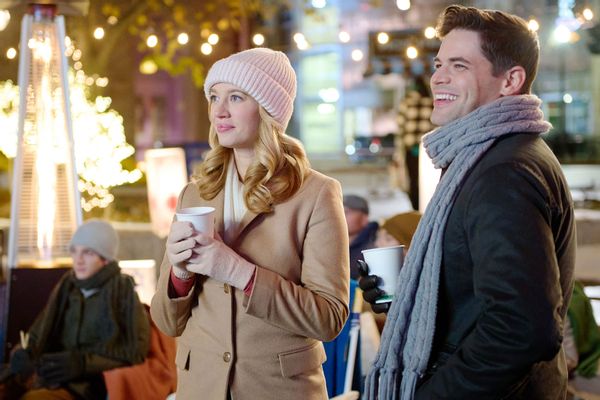
Since Hanukkah is more or less a holiday about Jewish resilience in the face of forced assimilation, I was glad to see a mainstream film, even one as openly saccharine as this, get something fundamental so correctly.
"Hanukkah on Rye" delivers on its basic promise: to be a Hanukkah movie. That may sound trite, but considering that Hallmark's previous Hanukkah films for their "Countdown to Christmas'' series, of which this film is a part, were really just Christmas movies where one of the romantic leads is a clueless Jew, there is something nominally refreshing about this year's original. But I really mean that only in the most basic sense. "Hanukkah on Rye's" central problem is that it never seems to want to let you forget that it's about Jews. There are about a hundred signifiers a minute; for some reason this manifests frequently with interstitials of bagels, pastrami and matzoh ball soup over Klezmer music, none of which is customary on Hanukkah. Every character uses Yiddish with impunity, and the film's running joke is that both families are exactly alike with only minute differences. Though this is played for a certain amount of charm, it only reinforces unfortunate antisemitic tropes. Jews are not a monolith; we exist in a variety of social classes and professional sectors with a (sometimes annoying) political variance. Yet, to watch "Hanukkah on Rye" is to experience a racial othering in real time, as if Jews are perennially stuck in some manufactured bubble in which we're all badgered by overbearing parents, we all eat Chinese food on Christmas Eve while we watch a movie, and the only thing we disagree on is the proper way to dress up a bagel with lox and capers.
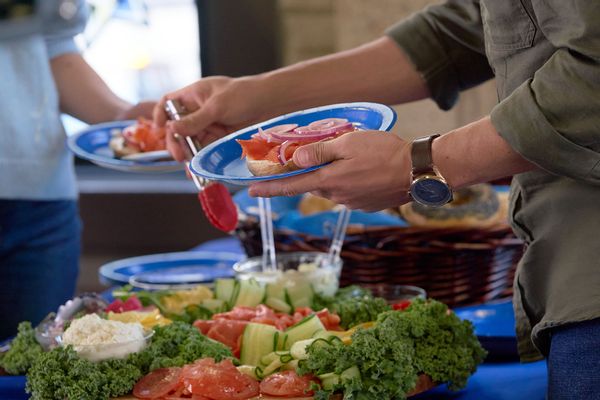
I am pretty sure that "Hanukkah on Rye" only uses the word beshert as many times as it does just to prove its intentions.
Yet, a broken clock is right at least twice, as the saying goes; for example, many doors have a mezuzah on them, and, miraculously, no one seems to have to explain it. The film's opening scene, in which Molly is making egg creams is a charming nod to a distinctly New York Jewish experience. But it is actually in a scene during the final act with which I was most taken aback. In a sharp contrast from previous Hallmark films, Wolfe and DeLuise allow Molly and Jacob to reflect on the Jewish immigrant experience. Perhaps unsurprisingly, the Holocaust is never mentioned, but Grobglas' character does speak to antisemitic treatment abroad and rough living conditions in New York; the kind of hard-knock life that paves the path for makeshift community centers, like Jewish delis, to provide comfort for those who've lost quite a bit. Since Hanukkah is more or less a holiday about Jewish resilience in the face of forced assimilation, I was glad to see a mainstream film, even one as openly saccharine as this, get something fundamental so correctly.
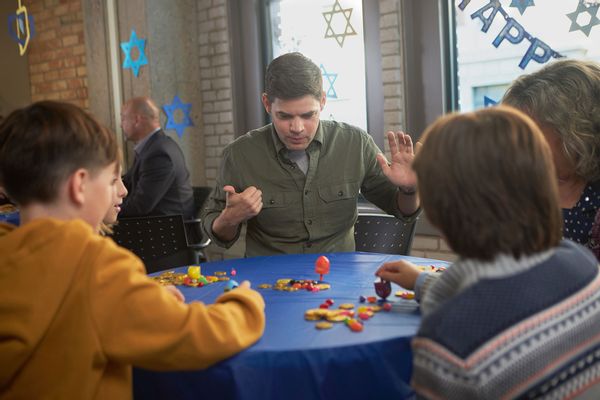
While it is tempting to dismiss Hallmark's Hanukkah films as candy-coated pablum, Hanukkah representation is infamously slim, and the "Countdown to Christmas" series pulled in 80 million viewers last year; it is enormously popular. That popularity matters when Hallmark's vast audience is made up of white, politically conservative households. The people who perceive Jews as empty stereotypes aren't Jews, but white people with little exposure to modern American Jewry. All these films cast Jews as both hyper-assimilated and as perpetual Other, a paradoxical narrative that allows them to be scapegoated and ignored in equal measure. As Terri-Toles Patkin points out, in her excellent essay "Hallmarking Hanukkah," which focuses on the interfaith films from 2019, these films neatly display the strange negotiation American media has had to consider over the last half century, as Hanukkah's public presence has outgrown its religious significance. With an estimated 61% of reported Jewish marriages being between a Jewish and non-Jewish partner since 2020, a capitalist hole emerges in the form of Jewish consumerism during the Holiday season.
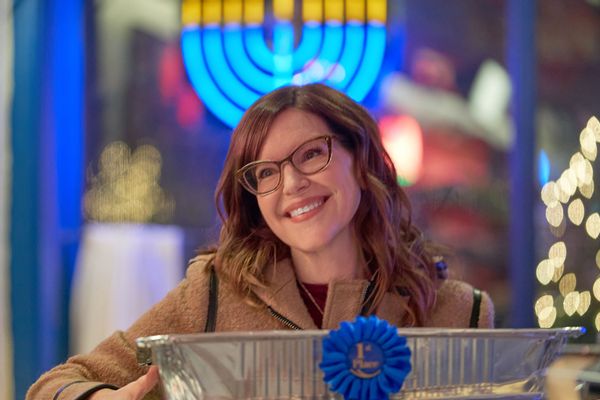
Ultimately I'm left wondering if Jewish inclusion in a consumerist and assimilated sector of the American zeitgeist is more harmful than helpful.
At the present rate, Hallmark is uncomfortably responsible for Jewish representation during the holiday season. Representation matters, since, according to recent FBI numbers, the prevelance of antisemitic hate crimes is at a rate of 57.1% of all religious-based attacks, and any kind of stereotype can and will inherently reduce a group of people to the level of an odd enemy. Further, Hallmark and Lifetime insist on an anachronistic application of Jewish identity through a rearview mirror, instead of considering what the modern American Jewish experience is actually like. It becomes increasingly important that Jewish films reflect an experience outside fantastical nostalgia, as more younger Jews look for identification outside of Zionism and a tacit support of Israel's apartheid. Obviously no one expects a Hallmark film to tackle such thorny issues, but if the alternative is to saddle Jews with absurd and dated stereotypes, I'd rather have none at all.
"Hanukkah on Rye" ultimately lands on the heartwarming notion that diasporic Jews, forever scattered and reaching for material connections to the past, may find each other in the future. And that sunny optimism, though expected for Hallmark, is commendable. But ultimately I'm left wondering if Jewish inclusion in a consumerist and assimilated sector of the American zeitgeist is more harmful than helpful. Why should Jews, or any minority, strive to be enfolded into a tradition of cultural and religious erasure? Many people have wondered why so few Hanukkah films exist, but maybe the better route is to find our experience reflected in the eyes of American Jewish filmmakers. Perhaps a better Hanukkah program should include works by Chantal Akerman, whose opus "Jeanne Dielman" (1975) just topped Sight & Sound's list of top films of all time. Or would the idiosyncratic work of the late, great Joan Micklin Silver, whose "Hester Street" (1975), with its completely Yiddish screenplay and themes of assimilation still ring true today? Just this year, Steven Spielberg and James Gray, both Jews, released autobiographical films in "The Fablemans" and "Armageddon Time," respectively. Perhaps we are thinking about what constitutes representation all wrong, a slippery term that probably has more to do with complexly drawn characters and families than the mere presence of a menorah and sufganiyot.
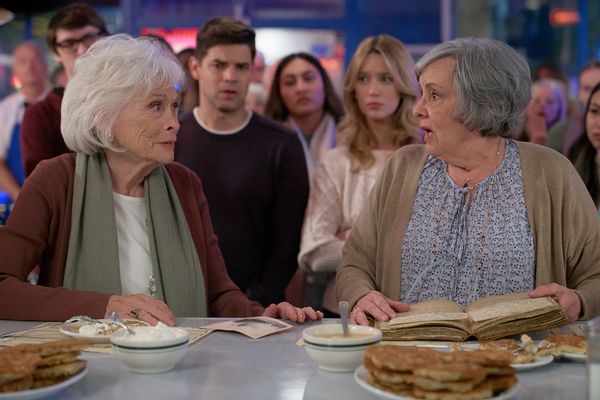
When I cried at the final scene in "Hanukkah on Rye," I also felt manipulated. The film projects a fantasy. Though that is admittedly the Hallmark mission, I wonder if, perhaps next time, Hallmark can make a film that feels grounded in reality. Perhaps I'm being naive. But, until then, I'll look for my representation elsewhere.







